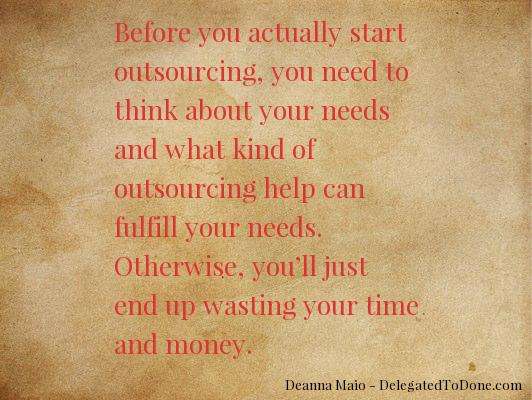Congratulations! You’ve started thinking about outsourcing part or even all of your business.
But before you actually start outsourcing, you need to think about your needs and what kind of outsourcing help can fulfill your needs. Otherwise, you’ll just end up wasting your time and money (and your prospective freelancer’s time).
The first thing you need to consider is what types of tasks you need completed. Specifically:
One-off tasks. This is when you hire someone to do a fast task, just once, such as creating a graphic for you. You don’t need to do as much due diligence with a one-off task, because you don’t have as much to lose.
Example: If you’re hiring someone for a $25 task, then it doesn’t make sense for you to spend a week finding the best candidate.
Long-term tasks. This is when you hire someone to complete a bigger project, one that may stretch out for many months or even longer.
Example: Perhaps you’ll hire a programmer to create a big piece of software from the ground up. Not only will the programmer do the coding, but you’ll want to retain his services for debugging and creating upgraded versions.
Nonetheless, you do expect your business relationship to end at some point, even if the exact date is unknown.
You’ll spend more time doing due diligence since you could waste a lot of time and money if you hire the wrong person.
- Full-time tasks. This is where you hire someone on a full-time basis, where you don’t expect your business relationship to end.
- Example: You might hire someone full time to field all your customer service inquiries.
However, check your local laws, because this person probably will be considered an employee as opposed to a contractor (which entails certain legal and taxation steps on your part).
Since you expect to work with this for a long time, you’ll want to do your due diligence as well as interview this person to find the best fit for your company.
Take a look at the tasks you need done – each of them should fall into one of the three above categories.
The second thing you need to think about is what type of freelancer can best complete your tasks. Specifically:
- Copywriters. Some people confuse “article writers” and other ghostwriters with copywriters. Copywriters, however, write copy – this includes sales letters, classified ads and other marketing collateral. This is a highly skilled profession, so expect to pay more than you would for a regular ghostwriter.
- Ghostwriters. These freelance writers create ebooks, reports, articles, blog posts and similar content. Do note that some writers specialize in creating certain types of content (such as articles), and some specialize in creating content for specific niches.
- Programmers. These are the folks who code your scripts and software. Take note, however, that programmers aren’t necessarily software architects. If you need help developing your software idea and communicating this idea in your project brief, you’ll need to hire a software architect.
- Customer service reps. This category includes people who field both pre-sale and post-sale inquiries. If you expect your reps to help close the sale, then you can expect to pay more (you may even offer base pay plus commissions). Also, if your reps need to field technical questions — such a software installation questions – then again, you can expect to pay more.
- Marketers. This includes PPC managers, search engine optimization specialists, affiliate managers and much more. Some of these folks maybe willing to work almost purely on commission (such as affiliate managers), while the vast majority will quote flat, yet ongoing monthly rates for their services.
In summary…
Before you even think of hiring a freelancer, you need to take stock of your business so you know what tasks you need done. This will help you seek out the right kind of freelancer for the right length of time.

